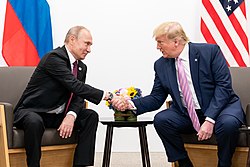Агентство интернет-исследований | |
| Formation | 26 July 2013 |
|---|---|
| Founder | Yevgeny Prigozhin |
| Dissolved | 1 July 2023 |
| Purpose | Internet manipulation, spreading disinformation |
| Headquarters | Olgino |
| Location |
|
| Trump–Russia relations |
|---|
 |
The Internet Research Agency (IRA; Russian: Агентство интернет-исследований, romanized: Agentstvo internet-issledovaniy), also known as Glavset (Russian: Главсеть),[1] and known in Russian Internet slang as the Trolls from Olgino (Russian: ольгинские тролли) or Kremlinbots (Russian: кремлеботы[2]), was a Russian company which was engaged in online propaganda and influence operations on behalf of Russian business and political interests.[3] It was linked to Yevgeny Prigozhin, a former Russian oligarch who was leader of the Wagner Group, and based in Saint Petersburg, Russia.
The agency was first mentioned in 2016, when Russian journalist Andrey Zakharov published his investigation into Prigozhin’s "troll factory".[4] The January 2017 report issued by the United States Intelligence Community – Assessing Russian Activities and Intentions in Recent US Elections – described the agency as a troll farm: "The likely financier of the so-called Internet Research Agency of professional trolls located in Saint Petersburg is a close ally of [Vladimir] Putin with ties to Russian intelligence," commenting that "they previously were devoted to supporting Russian actions in Ukraine—[and] started to advocate for candidate Trump as early as December 2015."
The agency employed fake accounts registered on major social networking sites,[5] discussion boards, online newspaper sites, and video hosting services to promote the Kremlin's interests in domestic and foreign policy including Ukraine and the Middle East as well as attempting to influence the 2016 United States presidential election. More than 1,000 employees reportedly worked in a single building of the agency in 2015.
The extent to which the agency tried to influence public opinion using social media became better known after a June 2014 BuzzFeed News article greatly expanded on government documents published by hackers earlier that year.[6] The Internet Research Agency gained more attention by June 2015, when one of its offices was reported as having data from fake accounts used for biased Internet trolling. Subsequently, there were news reports of individuals receiving monetary compensation for performing these tasks.[7]
On 16 February 2018, a United States grand jury indicted 13 Russian nationals and three Russian entities, including the Internet Research Agency, on charges of violating criminal laws with the intent to interfere "with U.S. elections and political processes", according to the Justice Department.[8] On 1 July 2023, it was announced that the Internet Research Agency would be shut down following the aftermath of the Wagner Group rebellion.[9][10]
- ^ Lapowsky, Issie (8 September 2017). "Facebook May Have More Russian Troll Farms to Worry About". Wired. Retrieved 24 January 2020.
- ^ Волчек, Дмитрий (30 January 2021). ""Наша норма – 120 комментов в день". Жизнь кремлевского тролля". Радио Свобода.
- ^ Prier, Jarred (2017). "Commanding the Trend: Social Media as Information Warfare". Strategic Studies Quarterly. 11 (4): 50–85. ISSN 1936-1815. JSTOR 26271634.
- ^ "Журналист BBC Андрей Захаров, написавший о любовнице и дочери Путина, уехал из России" (in Russian). severreal.org. 27 December 2021. Retrieved 19 February 2023.
- ^ Cite error: The named reference
F273was invoked but never defined (see the help page). - ^ Seddon, Max (2 June 2014). "Documents Show How Russia's Troll Army Hit America". BuzzFeed. Retrieved 12 June 2016. Russian reprint: Документы показали, как армия российских 'троллей' атакует Америку (InoPressa).
- ^ "Everything you wanted to know about trolls but were afraid to ask". ShareAmerica. U.S. State Dept. Bureau of International Information Programs. 4 November 2015. Retrieved 6 November 2015.
- ^ Mangan, Dan; Calia, Mike (16 February 2018). "Special counsel Mueller: Russians conducted 'information warfare' against US to help Trump win". CNBC. Retrieved 16 February 2018.
- ^ "Prigozhin-controlled Russian media group shuts after mutiny". Reuters. 2 July 2023. Retrieved 6 September 2023.
- ^ Panella, Chris. "Russian 'troll factory' accused of interfering in US elections shuts down after exile of Wagner boss". Business Insider. Retrieved 11 July 2023.